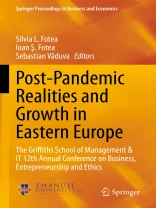As the COVID-19 crisis comes to an end, leaders, organizations, and governments have to develop a “new normal” for doing business with a focus on protecting the environment, integrating new technologies and adapting to new social changes. Based on empirical studies and conceptual contributions from researchers and practitioners presented at the Griffiths School of Management & IT’s 12th Annual Conference on Business, Entrepreneurship and Ethics (GSMAC), this proceedings volume provides a multifaceted perspective on the impact and effects of the COVID-19 pandemic on various public and private systems including education, business organizations and consumer behavior. In particular, this book explores the impact of the pandemic on remote work and employee health, sustainable development, and economic growth, among others. It also highlights the role of data analysis in understanding trends, opportunities, and challenges in the above systems.
Innehållsförteckning
Conceptual Model of Communication in the Relationship Marketing of Public Institutions in the Post-Pandemic Period.- Cultural Consumption in the Context of COVID-19 Pandemic: An Exploratory Approach.- Pillars of Interest of the 21st Century – Digitalization and Job Satisfaction.- The Impact of the COVID-19 Pandemic on the Propensity of Emerging Entrepreneurs to Start Social Enterprises in Romania.- The Influence of COVID-19 Crisis on Teachers’ Attrition in Israel 2021.- The Students’ Perception on Incorporating Google Classroom in Learning Economic Disciplines.- The Good Part of COVID-19 Pandemic: Increasing the Living Standards of Physically Challenged People by Accepting Telework as a New Normality, in Association with Assistive Technologies.- Post-Pandemic Quality and Performance of the Romanian Consular Services.- Religion in Young Romanian People Before and During COVID-19 – a Marketing Perspective.- An Examination of the Pet Food Buying Behavior Before and During the COVID – 19 Pandemic.- Is Telework Really Feasible in Israel?.- Highlighting the Main Poles of Political Performance and Governance Capacity at EU Level. Implications in the Context of COVID-19 Crisis.- Challenges in Managing the Resources of the Economic Entity Caused by the COVID 19 Pandemic.- Analysis of the Role of Trust and Uncertainty in Tourism Decision-Making as a Result of the Security Measures Introduced by SARS Cov-2.- Sustainable Industrial Development in Romania During the Covіd-19 Pandemic.- Green Economy: Opportunities for Reshaping Personal Transportation? Between Tough Technological Choices and Induced Client Behavior.- Comparative Analysis of Romania’s Regional Competitiveness.- Elaboration of a Circular Economy Composite Index for the EU27 Countries.- Shedding Light on the Effects of Corruption on Economic Growth. Empirical Evidence Across E.U. Countries Based on Panel Data Analysis and Simulation Forecast Scenarios.- Mapping the Field. Investigating the Literature on Informalityand COVID-19 Pandemic Through a Text Analysis Approach.- The Opportunity to Approach Sustainable Development from the Perspective of the Economic and Social Environment in the Context of the Covid-19 Crisis.- Box-Jenkins Methodology.- The Role of the Professional Accountant in Identifying Solutions for a Fast Business Recovery.- Index.
Om författaren
Silvia L. Fotea is a Lecturer in the Griffiths School of Management and IT at the Emanuel University of Oradea, Romania.
Ioan Ş. Fotea is an Associate Professor and Dean of Griffiths School of Management and IT at the Emanuel University of Oradea, Romania. He is the coordinator of Emanuel University’s Master in Entrepreneurial Management program and one of the founders of City Side Education (Oradea, Romania), a non-profit organization dedicated to youth education, while actively participating in various domestic and international business and social projects.
Sebastian A. Văduva is Chair of the Griffiths School of Management and IT at the Emanuel University in Oradea, Romania, as well as a management scholar with numerous active ties, academic and entrepreneurial, in both Europe and the United States. He has developed various seminars on leadership and effective management on both micro- and macro-economic levels and is behind several programs intended to boost Romanian economy by drawing in international investors and business partners.












